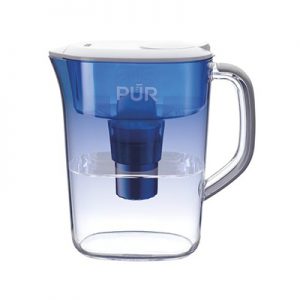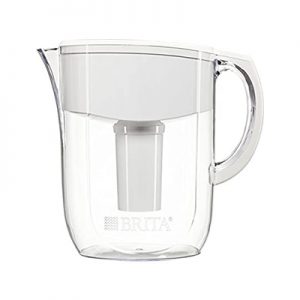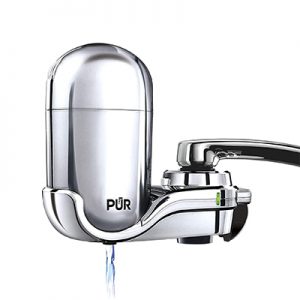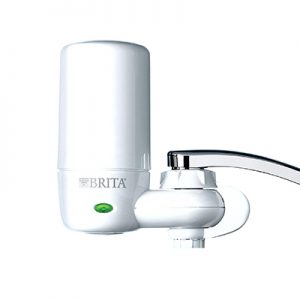Quick Links to Top Rated Products
Pur and Brita are two of the most popular, consistent, and well-respected water filter brands around—which is why their products take the top awards in both our pitcher filter and faucet water filter reviews.
But when both brands offer powerful filtering and good value for money, how do you decide between them? To help, here’s our comparison guide for the Pur Ultimate pitcher vs the Brita Longlast, and the Pur FM-3700 faucet filter vs the Brita 7540545.
Pitcher filter4.3/5.0 ★ Why we like: | Pitcher filter4.6/5.0 ★ Why we like: | Faucet filter | Faucet filter4.5/5.0 ★ Why we like: |
Brand overview – Pur vs Brita
Pur Vs Brita pitcher filters
| Let’s compare: | Pur Ultimate 11-Cup Pitcher | Brita 10-Cup Pitcher |
|---|---|---|
| Our pick for: | Top Pick Water Filter Pitcher | Best Overall Water Filter Pitcher |
| What we liked: |
|
|
| Things to consider: |
|
|
| Size and capacity: | 11 cup (88 fl oz) | 10 cup (80 fl oz) |
| Filter lifespan: | 30 gallons | 120 gallons |
| Extra contaminants removed: | Cysts, Lead, Emerging compounds, Copper | Asbestos, Lead, Emerging compounds, Cadmium |
| Customer reviews: | 4.1 (2,727 ratings) | 4.5 (9,032 ratings) |
| Price |
Value for money
The Pur Ultimate pitcher filter provides an above standard filtering power for a below average cost. With a competitive price point for the pitcher container and some of the cheapest filter cartridges of all the major brands, we don’t know of a water filter that can compete with the Pur Ultimate’s combination of power with initial costs.
That includes the Brita LongLast 10-Cup, which is considerably more expensive in terms of both the pitcher unit and replacement cartridges (although cartridge bundle deals are often available).
However, when shopping for water filters, it’s always important to weigh up initial costs versus the costs of filter replacements over time. We break this down in more detail in the section below, but we believe that the Brita filter catches up and overtakes the Pur in terms of value for money after between 2 and 3 years of use, depending on water purity in your area.
So, while you’ll make decent initial savings with the Pur, long-term cost efficiency is more likely to be found with the Brita pitcher.
Filter lifespan
As mentioned, filter lifespan is a key factor in how we, and you, should judge pitcher products. An attractive retail price or discount savings can be quickly wiped out if you invest in a filter that uses expensive cartridges with short lifespans.
In this category, the Pur Ultimate and Brita LongLast take different approaches. While the Pur’s cartridges offer only an estimated 30 gallons of filtering powering, they also retail among the cheapest of replacement filters. Brita cartridges, on the other hand, are noticeably expensive, but they’re also estimated to last for a huge 120 gallons—around four times as long as the Pur.
At that capacity, you can expect Brita cartridges to last for up to half a year with low to moderate use, or between 4 and 6 months for a full family. Pur cartridges, on the other hand, will likely need regular bi- or tri-monthly replacement.
We calculate the total 3 year cost of running the Brita LongLast in a soft to moderate water area at around $135, including purchase and filter replacements twice a year. This makes it the best long term value water filter pitcher we could find, for the quality of filtration it offers.
Remember: estimated lifespans are based on the average pre-treated tap water quality. In reality, they’ll vary by a large degree depending on the nature of your specific supply. If you live in an area with particularly hard water, for example, you can expect a noticeable reduction in filters’ endurance.
Extra contaminants removed
Water pitcher filters aren’t designed to turn unsafe water into something you can drink. Instead, they’re intended to be used on pre-treated tap water, which is already perfectly drinkable. Pitchers work mainly on the aesthetic qualities of water—the taste and smell—which can be affected by things like chlorine and other treatment chemicals, mineral content, and safe organic sediment.
Being two of the best pitcher filters on the market, however, the Pur Ultimate and the Brita LongLast both go a step further with their filtering power. Each is rated by the NSF to remove health-risking as well as aesthetic contaminants, and both score highly when it comes to their ability to reduce the quantities of lead in water down to safer levels (even traces of lead in drinking water are not considered safe).
Here, the Pur Ultimate offers the additional benefit of being able to remove cysts, which are small, micro-organism and parasites containing pockets in water. Whether you actually need a pitcher filter capable of removing cysts is something you’d likely already know—in other words, if you’re not using private well water, or haven’t been notified by your public provider about the presence of cysts, then it’s very unlikely you need to filter for them.
However, for those for whom cyst-filtering is a must, the Pur ultimate is one of the only standard pitcher filters able to claim this impressive filtering power.
Anything else?
All respected water filter manufacturers provide publicly available Performance Datasheets for each of their filter products, which break down the exact details of filter performance.
- Here’s the Performance data sheet for the Pur pitcher filter.
- Here’s the Performance data sheet for the Brita Longlife pitcher filter.
Our verdict
With Pur and Brita’s pitcher filters taking the top two spots in our full filter review, it’s no secret that we’re big fans of both products. The truth is that each of these pitchers is well worth your money, and their slight differences generally equal out when you consider the whole picture.
But, if we had to choose one, we’d go with Brita LongLast 10-Cup. Although it does have a slightly smaller capacity than the Pur Ultimate, and we found the lack of an LED cartridge life indicator annoying, we also think that it offers the best long-term cost efficiency of any pitcher filter, without sacrificing filter performance.
That said, we’d probably shift our recommendation to the Pur Ultimate 11-Cup if we were considering a pitcher filter for non-average tap water. If you have specific filtering needs, especially for removing cysts, then go with Pur, even though it may cost you slightly more in the long term.
Pur Vs Brita faucet filters
| Let’s compare: | Pur FM-3700 | Brita 7540545 |
|---|---|---|
| Our pick for: | Best overall faucet filter | Best value for money faucet filter |
| What we liked: |
|
|
| Things to consider: |
|
|
| Chlorine reduction: | 96% | 97.4% |
| Extra contaminants removed: | Lead, Asbestos | Lead, Asbestos, Cysts |
| Use/appearance options: |
|
|
| Customer reviews: | 4.5 (6,156 reviews) | 4.5 (5,602 reviews) |
| Price |
Contaminant removal
We didn’t just give the Pur FM faucet filter our award for Best Overall Filter, we also found it to be the Best Faucet Filter for Lead removal, removing more than 99 percent of the heavy metal. By using a combination of the standard activated carbon filter with an ion-exchange resin, the PUR FM-3700 is able to offer a slightly better performance than the Brita on several common contaminants, and is certified to remove a total of over 70 pollutants by the NSF.
As for the Brita 7540545, while it may have a slightly smaller contaminant range, it also performs slightly better in terms of removing the most contaminant behind why people purchase water filters: chlorine. While there’s little-to-no danger in consuming chlorine at the levels found in treated tap water, it can significantly affect water’s taste and smell, leaving an off-putting odor. The Brita is rated to reduce chlorine by 97.4%, as opposed to the 96% with the Pur. The Brita is also able to reduce cysts, if present.
Use and appearance
Unlike pitcher filters, which can usually be stored away in the refrigerator, faucet filters are always out on display. They also occupy a point of activity in your kitchen, the sink, so it’s important that these products (a) look good, and (b) don’t get in the way or disrupt your normal sink usage.
In this category, we prefer the standard model Pur FM over the standard model Brita. However, the Brita faucet filter is also offered in pricier constructions that we think beat both the standard models. We like the chrome finish of the standard Pur filter, while a small minority of customers have found that the plastic Brita model is liable to cracks and leaks after a short period.
That said, if you’re willing to pay a little more, the Brita faucet filter is also available in chrome and stainless steel finishes. These higher-priced Britas also incorporate an unfiltered spray option, allowing you to retain the original spray function of your tap.

Use/appearance options:
- Chrome, Stainless steel, black plastic (prices differ)
- Filtered, unfiltered, spray (in some models)
Anything else?
Manufacturer Performance Data Sheets are always the best place to get the exact details on what a filter product can and can’t remove:
- Here’s the performance data sheet for Brita’s faucet filter.
- Here’s the PUR FM-3700 performance data sheet.
Our verdict
Again, both the Pur and the Brita faucet filters dominated our full faucet filter review, which means there’s really almost nothing to split these two products apart. We can confidently say that either product will meet the filtering needs of the vast majority of users.
While the Pur is capable of removing a slightly wider range of contaminants, the Brita has the edge in reducing the amount of chlorine in water, and also removes cysts. Both filters significantly reduce any lead levels present in a tap supply. Each filter is also reportedly easy to attach and use, although some users of the Pur and the Brita have reported a reduced tap flow rate (an unavoidable symptom of using faucet filters).
Being picky, however, we’d choose the Pur FM-3700 over the Brita 1540545, because we think the standard model offers better value for money, with its aesthetically pleasing chrome finish that should suit most kitchens. While the Brita is also an excellent faucet filter, the basic model is constructed from plastic, and it has no 360º swivel function. Other more attractive Brita models are available, but at a higher price than the Pur.






